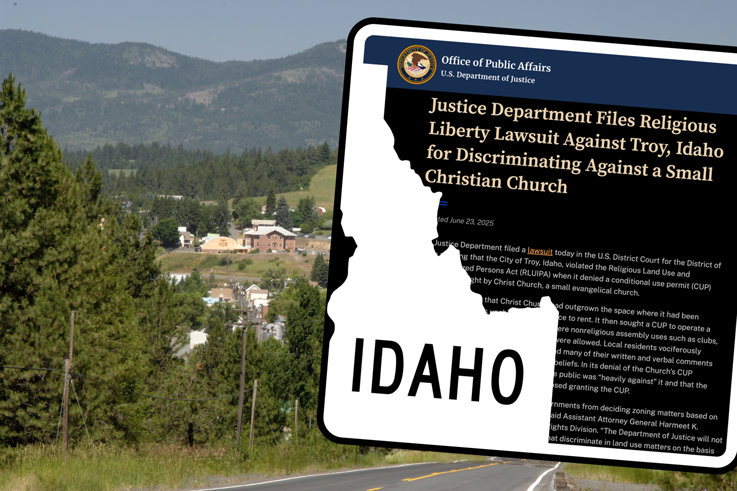
-
HOME
-
WHAT IS STANDOur Mission Our Values Our Help Contact
-
WHAT WE FIGHT FORReligious Freedom Religious Literacy Equality & Human Rights Inclusion & Respect Free Speech Responsible Journalism Corporate Accountability
-
RESOURCESExpert Studies Landmark Decisions White Papers FAQs David Miscavige Religious Freedom Resource Center Freedom of Religion & Human Rights Topic Index Priest-Penitent Privilege Islamophobia
-
HATE MONITORBiased Media Propagandists Hatemongers False Experts Hate Monitor Blog
-
NEWSROOMNews Media Watch Videos Blog
-
TAKE ACTIONCombat Hate & Discrimination Champion Freedom of Religion Demand Accountability
Department of Justice Sues Idaho Town for Religious Discrimination
The U.S. Department of Justice has stepped into a controversy in the small town of Troy, Idaho, by filing a lawsuit in U.S. District Court. The suit claims that Troy’s denial of Christ Church’s application for a meeting place violates the Religious Land Use and Institutionalized Persons Act.

Filed on May 20, 2025, the lawsuit says that the denial was discriminatory and “imposed an unjustified substantial burden on the exercise of religion.”
“RLUIPA unequivocally forbids local governments from deciding zoning matters based on their dislike of certain religious groups.”
The Religious Land Use and Institutionalized Persons Act, better known by the acronym RLUIPA, was adopted in 2000. In the words of the Justice Department, which is responsible for enforcing it, the land use part of the law is there to “protect individuals, houses of worship, and other religious institutions from discrimination in zoning and landmarking laws.” The law also protects the religious rights of those in prison or other institutions.
Since being enacted, RLUIPA has enabled many different religions—including Christians, Jews, Muslims and Buddhists—to secure their rights to establish places to conduct their religious activities.
The controversy in Troy began in late 2022 when a Christ Church elder purchased a former bank building on the town’s main street and shortly afterward applied for a conditional use permit (permission to use a property for a particular purpose, providing that certain conditions are met). Following a hearing in January 2023, the Troy City Council denied the permit application in March.
The Justice Department, which began its investigation shortly after the denial, alleges that the City of Troy’s refusal was due to prejudice on the part of government officials and members of the community and not for a legitimate reason related to land use. It quoted numerous statements made by Troy residents expressing hostility to Christ Church’s conservative Christian theology and practices—made both in writing and orally at the public hearing—as well as negative press coverage.
“RLUIPA unequivocally forbids local governments from deciding zoning matters based on their dislike of certain religious groups,” said Assistant Attorney General for Civil Rights at the U.S. Department of Justice.
The lawsuit also claims that there is no reason to think that the Church would have any tangible negative impact on Troy’s downtown: the primary use would be on Sunday mornings when downtown would be mostly deserted, there is ample provision for parking and several other churches already operate in the area without generating any complaints.
For its part, the City of Troy claims that a church in its main business district “is against the will of the people and will have a negative effect on the City’s ability to grow its business community.”
Troy will now have to determine if it is going to grant Christ Church’s request for a conditional use permit or litigate to be allowed to exclude them. If the matter is litigated, Troy, to prevail, will need to show that its behavior is not discriminatory and is instead a correct and neutral application of zoning and land use law. The Justice Department, on the other hand, will attempt to prove its claims that Troy’s refusal to grant the church a permit is a manifestation of religious intolerance, and denies to the members of Christ Church the right to freely practice their religion.









